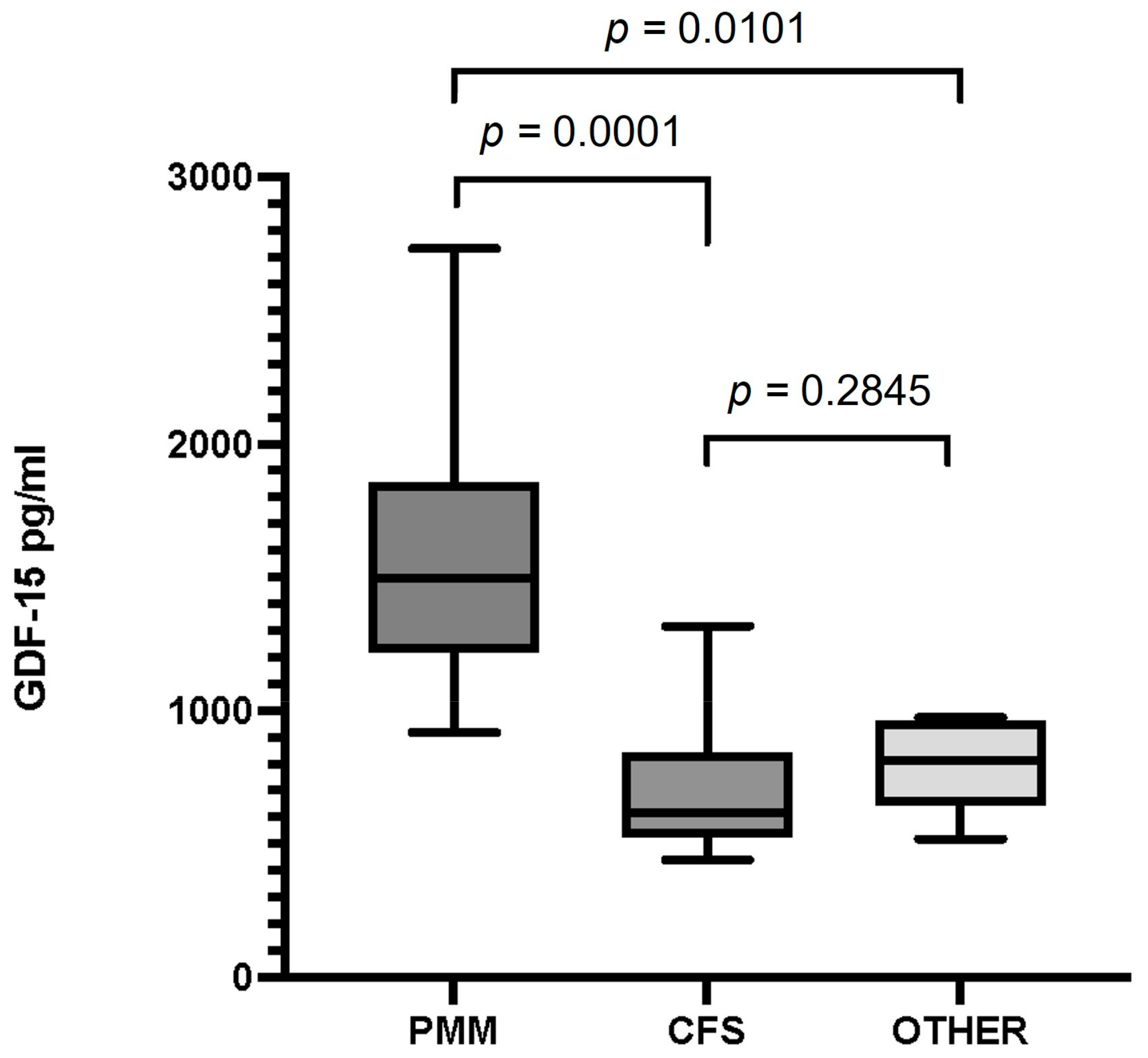cassava7
Senior Member (Voting Rights)
Serum GDF-15 Levels Accurately Differentiate Patients with Primary Mitochondrial Myopathy, Manifesting with Exercise Intolerance and Fatigue, from Patients with Chronic Fatigue Syndrome
Authors from the Neuromuscular Disorders Unit of the Hospital Universitario 12 de Octubre in Madrid (national reference center of rare neuromuscular diseases in Spain)
Abstract
Primary mitochondrial myopathies (PMM) are a clinically and genetically highly heterogeneous group that, in some cases, may manifest exclusively as fatigue and exercise intolerance, with minimal or no signs on examination. On these occasions, the symptoms can be confused with the much more common chronic fatigue syndrome (CFS).
Nonetheless, other possibilities must be excluded for the final diagnosis of CFS, with PMM being one of the primary differential diagnoses. For this reason, many patients with CFS undergo extensive studies, including extensive genetic testing and muscle biopsies, to rule out this possibility.
This study evaluated the diagnostic performance of growth differentiation factor-15 (GDF-15) as a potential biomarker to distinguish which patient with chronic fatigue has a mitochondrial disorder. We studied 34 adult patients with symptoms of fatigue and exercise intolerance with a definitive diagnosis of PMM (7), CFS (22), or other non-mitochondrial disorders (5).
The results indicate that GDF-15 can accurately discriminate between patients with PMM and CFS (AUC = 0.95) and between PMM and patients with fatigue due to other non-mitochondrial disorders (AUC = 0.94). Therefore, GDF-15 emerges as a promising biomarker to select which patients with fatigue should undergo further studies to exclude mitochondrial disease.
https://www.mdpi.com/2077-0383/12/6/2435
Authors from the Neuromuscular Disorders Unit of the Hospital Universitario 12 de Octubre in Madrid (national reference center of rare neuromuscular diseases in Spain)
Abstract
Primary mitochondrial myopathies (PMM) are a clinically and genetically highly heterogeneous group that, in some cases, may manifest exclusively as fatigue and exercise intolerance, with minimal or no signs on examination. On these occasions, the symptoms can be confused with the much more common chronic fatigue syndrome (CFS).
Nonetheless, other possibilities must be excluded for the final diagnosis of CFS, with PMM being one of the primary differential diagnoses. For this reason, many patients with CFS undergo extensive studies, including extensive genetic testing and muscle biopsies, to rule out this possibility.
This study evaluated the diagnostic performance of growth differentiation factor-15 (GDF-15) as a potential biomarker to distinguish which patient with chronic fatigue has a mitochondrial disorder. We studied 34 adult patients with symptoms of fatigue and exercise intolerance with a definitive diagnosis of PMM (7), CFS (22), or other non-mitochondrial disorders (5).
The results indicate that GDF-15 can accurately discriminate between patients with PMM and CFS (AUC = 0.95) and between PMM and patients with fatigue due to other non-mitochondrial disorders (AUC = 0.94). Therefore, GDF-15 emerges as a promising biomarker to select which patients with fatigue should undergo further studies to exclude mitochondrial disease.
https://www.mdpi.com/2077-0383/12/6/2435
Last edited by a moderator:


